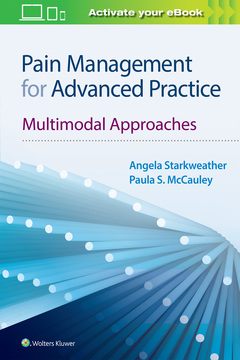Description
Pain Management for Advanced Practice
Multimodal Approaches
Authors: Starkweather Angela, McCauley Paula S.
Language: English
Subject for Pain Management for Advanced Practice:
78.94 €
In Print (Delivery period: 14 days).
Add to cart
Publication date: 10-2019
250 p. · 15.2x22.9 cm · Paperback
250 p. · 15.2x22.9 cm · Paperback
Description
/li>
Handle the vital issue of pain management safely and effectively, with the proven range of treatments offered in Pain Management for Advanced Practice.
Offering compassionate, holistic pain management strategies — pharmacological and nonpharmacological — this expert guide supports evidence-based decision making, with multimodal care options that include cognitive behavioral therapy, yoga, acupuncture, analgesics and supplementary pharmaceuticals. Essential for clinicians in all practice areas, this is the real-world support all advanced practice clinicians need for managing patients in pain.
Offer effective pain management across the spectrum of acute and chronic pain conditions:
About the Authors
Angela Starkweather, PhD, ACNP-BC, CNRN, FAAN, is a Professor at the Center for Advancement in Managing Pain at the University of Connecticut School of Nursing in Storrs, Connecticut.
Paula S. McCauley, DNP, APRN, ACNP-BC, FAANP, is an Acute Care Nurse Practitioner in Cardiology, Cardiothoracic Surgery at the University of Connecticut Health, and is an Associate Professor at the University of Connecticut School of Nursing in Storrs, Connecticut.
Offering compassionate, holistic pain management strategies — pharmacological and nonpharmacological — this expert guide supports evidence-based decision making, with multimodal care options that include cognitive behavioral therapy, yoga, acupuncture, analgesics and supplementary pharmaceuticals. Essential for clinicians in all practice areas, this is the real-world support all advanced practice clinicians need for managing patients in pain.
Offer effective pain management across the spectrum of acute and chronic pain conditions:
- Current data from studies that demonstrate real-life application of proven modalities
- Supports National Institutes of Health pain treatment options – innovative medications and technologies that treat opioid use disorders, for improved overdose prevention and reversal interventions that save lives and support recovery
- Designed to support both patients and their families in ways that avoid the pitfalls of the opioid epidemic
- Key Points listed in each chapter offering vital clinical tips
- Chapters that address a wide range of pain management models and treatments, including:
- Biopsychosocial model of pain and patient-centered pain management – multimodal treatment strategies that holistically address the needs of the patient and their family on biologic, psychological, social and spiritual levels
- Pain neurophysiology and phenotypes – common types of pain, including complex regional pain syndrome, fibromyalgia, irritable bowel syndrome, neuropathy, osteoarthritis, piriformis syndrome, sciatica
- Pain assessment, clinical history and examination
- Diagnostic testing and imaging of pain
- Multimodal management of pain – perioperative, neck and low back, chronic, cancer, other musculoskeletal pain
- Psychotherapy and cognitive behavioral therapy
- Pharmacologic management – pain pharmacogenetics, opioid and nonopioid analgesics, adjuvant therapies (including herbals and supplements), managing multiple symptoms
- Nonpharmacologic management – aromatherapy, breath therapy, thermal therapy, distraction, gaming/virtual reality, music therapy, massage, reiki, acupuncture, movement therapy, electrocutaneous therapy, nutritional interventions, spinal manipulation, exercise, acupuncture, massage, tai chi, yoga, mindfulness, music
- Interventional pain management
- Surgical and procedural pain management – postoperative pain assessment, opioid and nonopioid analgesia, peripheral nerve block and local anesthetics, nonsteroidal anti- inflammatory drugs
- Treating pain in the addicted patient
- System-level pain management
- A must-have for advanced practice clinicians in all practice areas, particularly medical-surgical, critical care, oncology and emergency care
About the Authors
Angela Starkweather, PhD, ACNP-BC, CNRN, FAAN, is a Professor at the Center for Advancement in Managing Pain at the University of Connecticut School of Nursing in Storrs, Connecticut.
Paula S. McCauley, DNP, APRN, ACNP-BC, FAANP, is an Acute Care Nurse Practitioner in Cardiology, Cardiothoracic Surgery at the University of Connecticut Health, and is an Associate Professor at the University of Connecticut School of Nursing in Storrs, Connecticut.
© 2024 LAVOISIER S.A.S.

